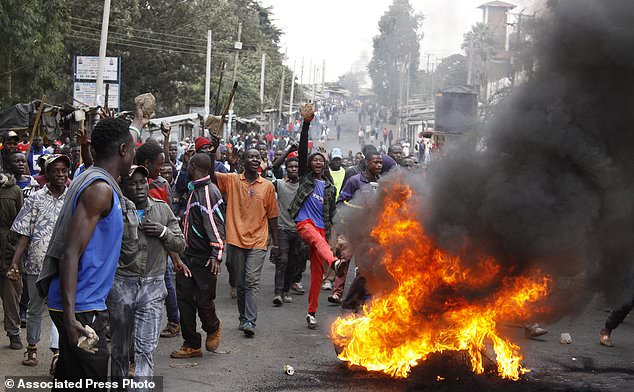Pressure mounts on Nasa to quell deadly protests

The National Super Alliance faced mounting calls at home and abroad to calm their supporters Sunday after claims of election rigging sparked violent protests that left at least 11 people dead.
Raila Odinga’s flashpoint strongholds in western Kisumu and Nairobi’s slums were quiet Sunday, with signs life was returning to normal after two days of running battles with police. Officers in some clashes used live ammunition to disperse stone-throwing, tyre-burning residents, with tear gas also fired.
REFRAIN FROM VIOLENCE
UN Secretary-General Antonio Guterres urged thwarted presidential candidate Raila Odinga to “send a clear message to his supporters urging them to refrain from violence”, a message echoed by British Foreign Secretary Boris Johnson.
The anger erupted on Friday night after President Uhuru Kenyatta was declared the victor by a large margin against his rival Odinga following an election pollsters had described as too close to call.
Mr Odinga’s Nasa coalition has insisted their candidate is the rightful winner, saying he was robbed of victory through hacking and manipulation of an electronic vote tallying system.
However calls for them to take their grievances to court, while Kenya’s foreign partners heap congratulations on Kenyatta, have left them isolated and under mounting pressure.
Mr Odinga, 72, a mainstay of the Kenyan opposition since the 1980s, has been silent since his loss was announced, but his party officials have said they will neither back down nor take their grievances to court.
“We will not be cowed, we will not relent,” Nasa official Johnson Muthama told reporters on Saturday.
In Nairobi’s Mathare slum, shops and markets slowly began opening and there was no sign of police or protesters Sunday morning.
“We want to hear Raila. We want to hear what he has to say. It’s him who will guide us. If he tells us to go on the streets, we will go on the streets. If he wants us to stay home, we will stay stay home,” said 25-year-old hairdresser Humpfrey Songole in Mathare.
EXERCISE RESTRAINT
Muthama claimed that 100 people had been killed, without providing evidence. According to an AFP tally, 11 people have died since the result was announced Friday.
The toll includes a young girl whose family said she had been shot in the back while playing on a balcony in Mathare as police opened fire on protesters. Eight others died in the capital, while one demonstrator was shot dead in western Kisumu county and another in southwestern Siaya.
The Doctors without Borders (MSF) charity said on Twitter that it had treated 54 wounded people in its clinics.
The post-election violence is the worst since a disputed 2007 poll which Odinga claimed was stolen from him. That led to two months of protests and ethnic killings which left 1,100 dead and 600,000 displaced.
Britain’s Johnson urged Kenya’s opposition to “exercise restraint” to ensure calm.
The European Union’s foreign affairs chief Federica Mogherini urged the opposition “to respect the results and to use legal means available for appeals and complaints.”
In another blow to the opposition, local election observer group ELOG, which deployed 8,300 observers and conducted a parallel tallying operation, determined Kenyatta had won with 54 per cent — the same figure given by the electoral commission.
Mr Odinga, who lost his fourth shot at the presidency, in 2013 also disputed Kenyatta’s poll victory, however took his case to the Supreme Court where he lost.
“We have been there before. Court is not an alternative,” said top Nasa official James Orengo.
ZERO-SUM GAME
Kenyan media also urged Odinga to step up and address his supporters.
“Nasa must direct its supporters to stand down, no matter how justified it feels that the presidential tally was rigged,” wrote the Standard newspaper in an editorial, while slamming the police response to protests.
Interior Minister Fred Matiangi denied there had been any casualties or that “innocent protesters” had been killed, saying police had clamped down on “criminal elements” taking advantage of the tension to loot and rob.
Politics in Kenya is largely divided along tribal lines, and the winner-takes-all nature of elections has long stoked communal tensions.
Mr Odinga’s ethnic Luo supporters — and their allies from other groups — believe they have been denied political power by elites from the Kikuyus, the same ethnic group as Kenyatta, the country’s biggest community.
“The reason elections have become a trigger for violence is the relationship between power and prosperity. It is a zero sum game and winning becomes a life and death matter, hence losing is not an option,” wrote the Daily Nation in its editorial.
AFP